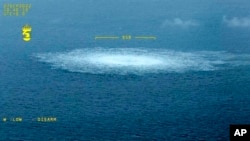ອົງການ NATO ປະກາດທີ່ຈະຕອບໂຕ້ ໃນວັນພະຫັດວານນີ້ ຕໍ່ການໂຈມຕີທີ່ຮ້າຍແຮງໃສ່ພື້ນຖານໂຄງລ່າງຂອງ 30 ປະເທດສະມາຊິກ ໃນຂະນະທີ່ສະເໜີຢ່າງແຂງຂັນວ່າ ການແຕກຂອງສອງທໍ່ສົ່ງຢູ່ທະເລບາລຕິກ ທີ່ສົ່ງແກັສທຳມະຊາດຈາກຣັດເຊຍໄປຫາເຢຍຣະມັນນັ້ນ ເປັນຜົນຈາກການລອບໂຈມຕີໂດຍກົງ.
ບັນດານັກການທູດປະຈຳອົງການ NATO ທີ່ເປັນພັນທະມິດສຳຄັນຂອງປະເທດຕາເວັນຕົກ ກ່າວຢູ່ໃນຖະແຫລງການວ່າ “ຄວາມຕັ້ງໃຈໃດໆທີ່ຈະໂຈມຕີ ຕໍ່ໂຄງພື້ນຖານໂຄງລ່າງທີ່ສຳຄັນຂອງພັນທະມິດຈະພົບກັບການໂຕ້ຕອບແບບສາມັກຄີ ແລະມີຄວາມແນ່ວແນ່.” ເຂົາເຈົ້າກ່າວວ່າ ການແຕກແຫງຢູ່ສີ່ບ່ອນຂອງທໍ່ແກັສ ແມ່ນ “ມີຄວາມເປັນຫ່ວງຢ່າງເລິກເຊີ່ງ.”
ອົງການ NATO ບໍ່ໄດ້ກ່າວຫາຜູ້ໃດ ໃນການທຳລາຍທໍ່ແກັສ ແຕ່ກໍໄດ້ກ່າວວ່າ “ຂໍ້ມູນທີ່ມີທັງໝົດ ໃນປັດຈຸບັນນີ້ໄດ້ຊີ້ບອກໃຫ້ເຫັນວ່າ ນີ້ເປັນຜົນຂອງຄວາມຕັ້ງໃຈ ບໍ່ຫົວຊາ ແລະບໍ່ມີຄວາມຮັບຜິດຊອບຂອງການລອບທຳລາຍ. ການຮົ່ວໄຫຼດັ່ງກ່າວເຮັດໃຫ້ເປັນອັນຕະລາຍຕໍ່ການຂົນສົ່ງ ແລະຕໍ່ສິ່ງແວດລ້ອມຢ່າງຮ້າຍແຮງ.”
ຢູ່ມົສກູ ໂຄສົກວັງເຄຣັມລິນ ທ່ານດີມີຕຣີ ແພສກັອຟ ກ່າວໃນວັນພະຫັດວານນີ້ວ່າ ການແຕກແຫງຂອງທໍ່ແກັສ Nord Stream ຈະເປັນໄປບໍ່ໄດ້ໂດຍປາດສະຈາກການພົວພັນຂອງປະເທດໃດນຶ່ງ.
“ເບິ່ງຄືວ່າເປັນການໂຈມຕີຈາກຜູ້ກໍ່ການຮ້າຍ ທີ່ອາດຈະຢູ່ໃນລະດັບປະເທດ” ທີ່ທ່ານແພສກັອຟ ໄດ້ກ່າວຕໍ່ບັນດານັກຂ່າວ. ປະທານາທິບໍດີຣັດເຊຍ ທ່ານວລາດີເມຍ ປູຕິນ ຕໍ່ມາໄດ້ກ່າວຕໍ່ນາຍົກລັດຖະມົນຕີເທິກີ ທ່ານຣີເຊບ ຕາຢິບ ເອີີດວນ ວ່າ “ການກໍ່ການຮ້າຍສາກົນ” ໄດ້ຖືກຖີ້ມໂທດໃສ່.
ທ່ານແພສກັອຟ ກ່າວວ່າ “ຊັ່ງຊາເບິ່ງນຄວາມເສຍຫາຍແລ້ວ Nord Stream ມັນຍາກທີ່ຈະວາດພາບເຖິງການກະທຳດັ່ງກ່າວ ທີ່ສາມາດເຮັດລົງໄດ້ໂດຍປາດສະຈາກການພົວພັນຂອງປະເທດໃດນຶ່ງ. ມັນເປັນສະພາບການທີ່ຮ້າຍແຮງ ທີ່ຕ້ອງການ ການສືບສວນຢ່າງຮີບດ່ວນ.”
ພວກເຈົ້າໜ້າທີ່ຢູໂຣບຈຳນວນນຶ່ງ ແລະບັນດາຜູ້ຊ່ຽວຊານພະລັງງານໄດ້ສະເໜີວ່າ ຣັດເຊຍອາດເປັນຜູ້ປະຕິບັດການໂຈມຕີ ເພື່ອຜົນປະໂຫຍດຈາກການຂຶ້ນລາຄາພະລັງງານ ແລະສ້າງຄວາມວຸ້ນວາຍທາງເສດຖະກິດໃຫ້ແກ່ຢູໂຣບ ໃນການສະໜັບສະໜູນຢູເຄຣນ ເພື່ອປ້ອງກັນປັດປ່າຍການບຸກລຸກເປັນເວລາເຈັດເດືອນຂອງຣັດເຊຍ. ແຕ່ພວກເຈົ້າໜ້າທີ່ອື່ນໆໄດ້ຮຽກຮ້ອງໃຫ້ລະມັດລະວັງໃນການຊັ່ງຊາເພື່ອຖີ້ມໂທດ ຈົນກວ່າວ່າບັນດານັກສືບສວນພິຈາລະນາວ່າ ໄດ້ມີຫຍັງເກີດຂຶ້ນ.
NATO vowed retaliation Thursday for attacks on the critical infrastructure of its 30 member nations, while strongly suggesting the rupture of two Baltic Sea pipelines meant to send natural gas from Russia to Germany was the direct result of sabotage.
Ambassadors to NATO, the West's key military alliance, said in a statement, "Any deliberate attack against allies' critical infrastructure would be met with a united and determined response." They said four ruptures in the pipelines were of "deep concern."
NATO did not accuse anyone of damaging the pipelines but said that "all currently available information indicates that this is the result of deliberate, reckless, and irresponsible acts of sabotage. These leaks are causing risks to shipping and substantial environmental damage."
In Moscow, Kremlin spokesman Dmitry Peskov said Thursday that the ruptures in the Nord Stream pipelines would not have been possible without a state actor's involvement.
"It looks like a terror attack, probably conducted on a state level," Peskov told reporters. Russian President Vladimir Putin later told Turkish President Recep Tayyip Erdogan that "international terrorism" was to blame.
"Judging by the amount of destruction of the Nord Stream, it's hard to imagine that such action could have been taken without a state involvement," Peskov said. "It's a very dangerous situation that requires a quick investigation."
Some European officials and energy experts have suggested that Russia likely carried out the attacks, to benefit from higher energy prices and to create more economic chaos in Europe for its support of Ukraine in fending off Russia's seven-month invasion. But other officials urged caution in assessing blame until investigators determine what happened.




